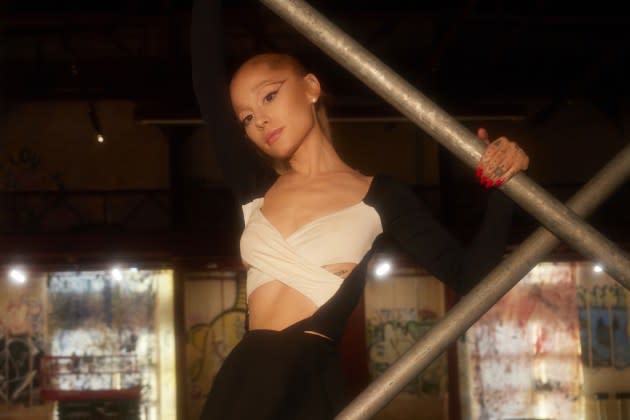Ariana Grande Is Gorgeously Exposed on ‘Eternal Sunshine’

Ariana Grande’s seventh album begins with a question she spends the rest of the album trying to answer: “How can I tell if I’m in the right relationship?” Five years ago, on her landmark album on Thank U, Next, it seemed certain that she would have that question figured out by now; in the bridge of that album’s title track, she sang about hoping that when she would eventually walk down the aisle it would be her first and last time.
At 30, she’s less convinced she’ll ever quite know or understand how eternal love works. If you’re expecting Sweetener-level optimism from Eternal Sunshine, that’s not what you’re going to get: Grande’s latest is a gorgeously exposed journey to the end of her world — or at least what she believes to be the end. It’s a divorce album that goes through all the stages of grief, and the singer navigates a new beginning with some of the most honest and inventive songs of her career so far.
More from Rolling Stone
How a Retired YouTube Astrologer Ended Up on Ariana Grande's 'Saturn Returns Interlude'
Ariana Grande, Bleachers, Young Miko and All the Songs You Need to Know This Week
Everything We Learned About Ariana Grande's Divorce (and New Love) on 'Eternal Sunshine'
Grande gets the most intense feelings of heartbreak out of the way first. After “Intro (End of the World)” poses the album’s central question, she spends the next couple songs fighting for either herself or her relationship. On “Bye,” she’s more than ready to let go. She’s so ready her friend Courtney is in the driveway waiting for the star to hop in the car with her stuff. “Don’t Wanna Break Up Again” is a little more uncertain; she paints a portrait of a negligent partner she knows she needs to leave but doesn’t want to give up on yet. The early songs are a bit Seventies pop in their approach, with Grande doing her best Diana Ross impression.
The title track, “Eternal Sunshine,” slips deeper into the hurt. She wants to “wipe [her] mind,” like the 2004 movie Eternal Sunshine of the Spotless Mind, for which the album and song are named. Grande spirals beautifully on the R&B-pop cut: “I’ll be the first to say I’m sorry/Now you got me feeling sorry/I showed you all my demons all my lies/Yet you played me like Atari.”
Cutting through the heartache is a bit of advice: “Saturn Returns Interlude” features a sample of obscure astrologer Diana Garland’s YouTube video on why 29 is an important age. “Saturn comes along and hits you over the head and says ‘Wake up! It’s time for you to get real about life and sort out who really are,’” Garland sagely offers. Grande takes this advice to heart from “Eternal Sunshine” on. She toggles between moments of resilience, acceptance, and hope for the future, no matter how uncertain it may be. Like lead single “Yes And?” (which is perhaps the weakest of the bunch when lined up against the rest of the album), “True Story” plays a bit with public perception of her, with Grande offering to “play the villain” or “the bad girl” in someone’s eyes over a beat that sounds like something Timbaland would have made for Aaliyah.
“The Boy Is Mine” — sure to be a point of stan Twitter controversy given chatter around the timeline of her and current partner Ethan Slater’s relationship — is another late Nineties, early Aughts R&B-pop moment. It’s Grande’s flip on the 1998 Brandy and Monica duet of the same name, but actually feels more like a sequel to the ‘NSync-sampling “Break Up With Your Girlfriend” off Thank U, Next with its propulsive, bass-heavy beat.
The final four songs on Eternal Sunshine are some of the strongest of Grande’s career. “We Can’t Be Friends (Wait for Your Love)” is as perfect as a big pop anthem can get. Grande’s vocal delivery is intimate and vulnerable next to the Robyn-esque dance beat. It almost sounds like a love letter to the work of Max Martin, Grande’s primary (and longtime) collaborator on the album, as well as the great pop princesses with whom he has partnered with over the course of his career.
She shows more restraint on “I Wish I Hated You,” a grown up break-up reflection about realizing that even after it’s over, the love will take longer to shake off. Though she hasn’t worked with playwright Jason Robert Brown since Dangerous Woman, it owes a lot to his own divorce post-mortem musical The Last Five Years.
By the end of the album, Grande comes as close as anyone possibly can to answering her question from the start of the album. But she, like everyone else, owns up to the fact that it’s a fool’s errand to understand how love works. Album closer “Ordinary Things” sums it all up, with some help from her Nonna. Grande celebrates the simple joys of spending time with someone you care about. Her Nonna astutely points out how you can at least tell when it’s over: “if you don’t feel comfortable” kissing them goodnight, even after a big fight then “you’re in the wrong place…get out.” There’s no better answer to life’s big questions than that.
Best of Rolling Stone